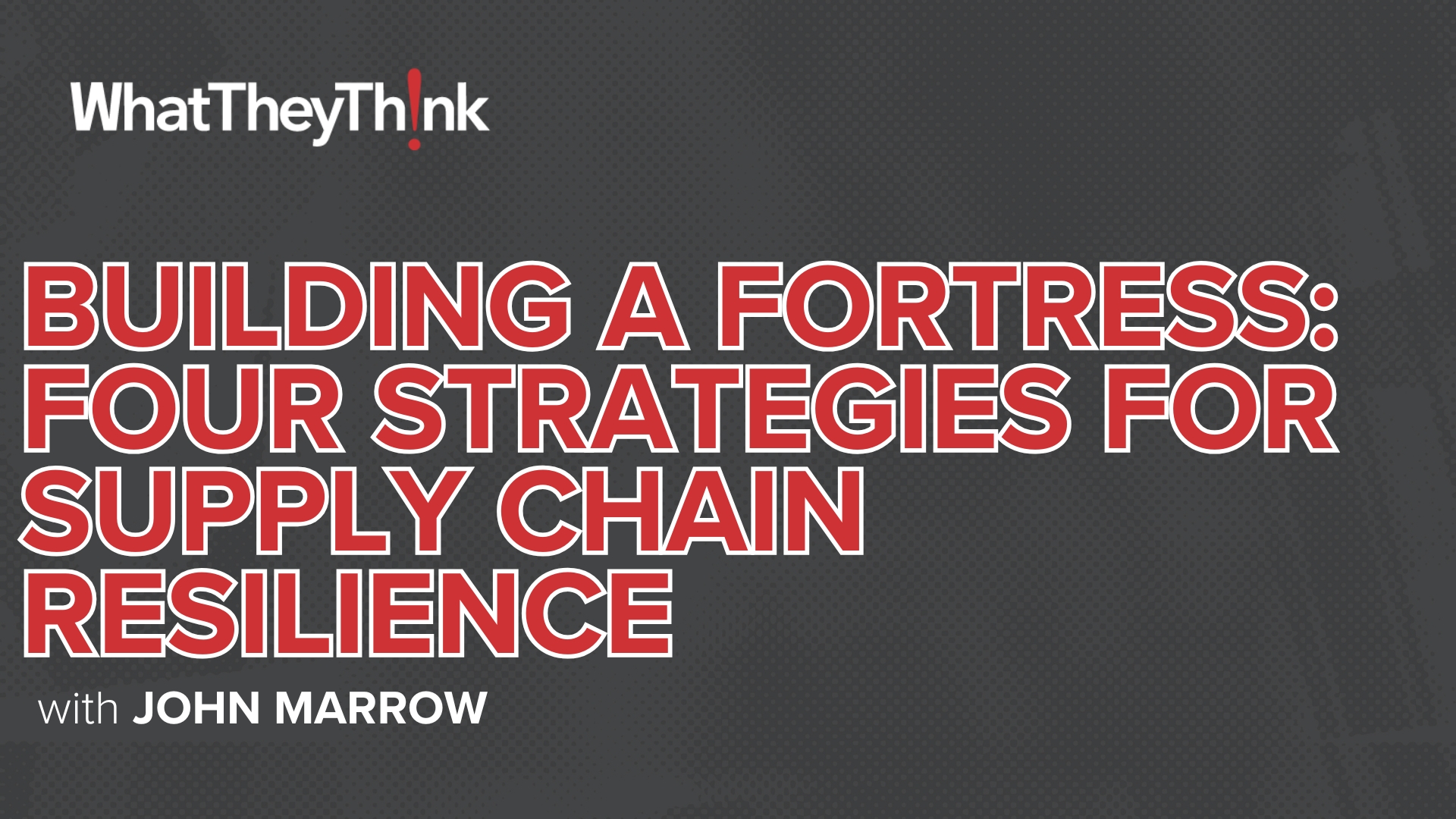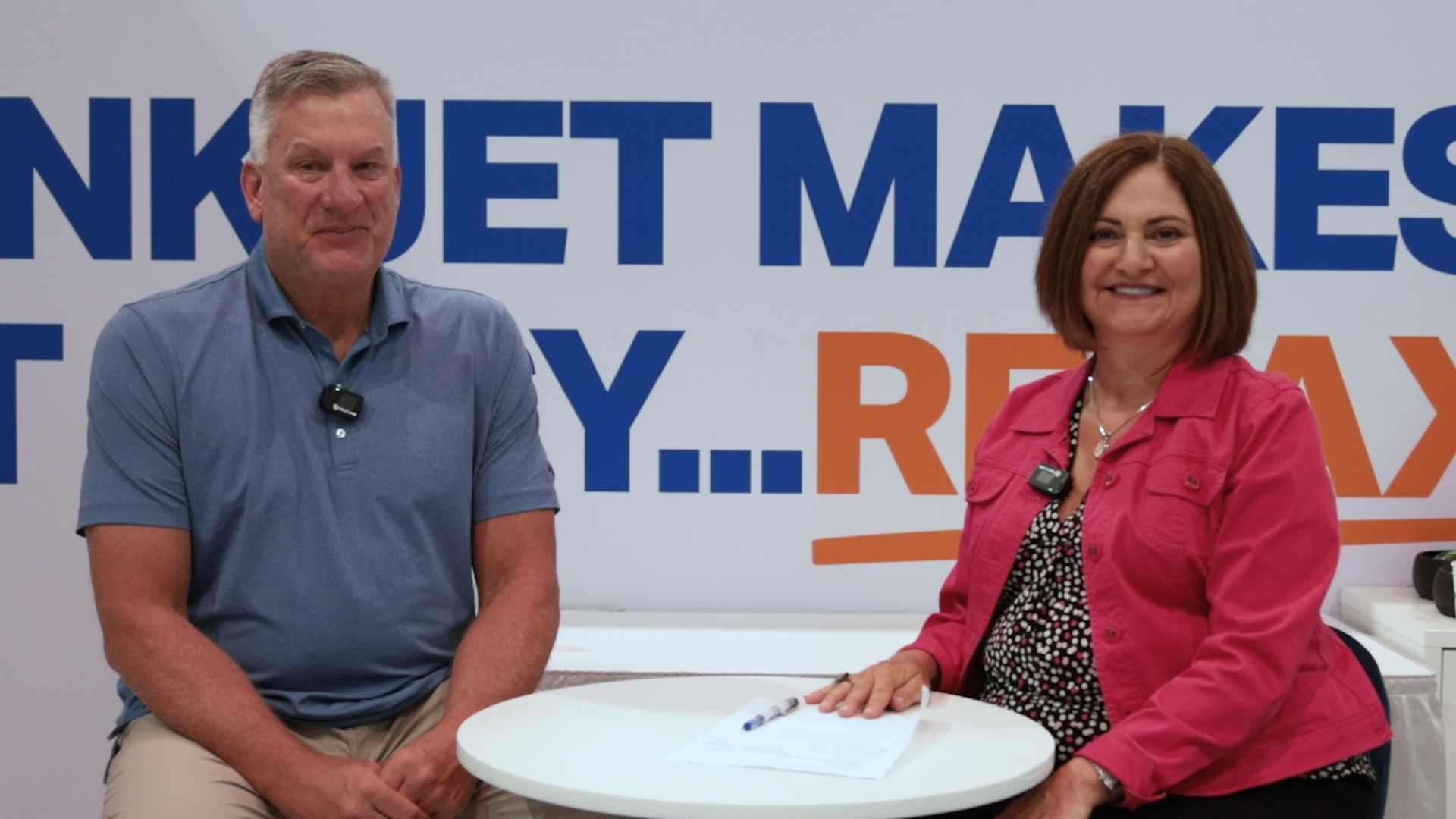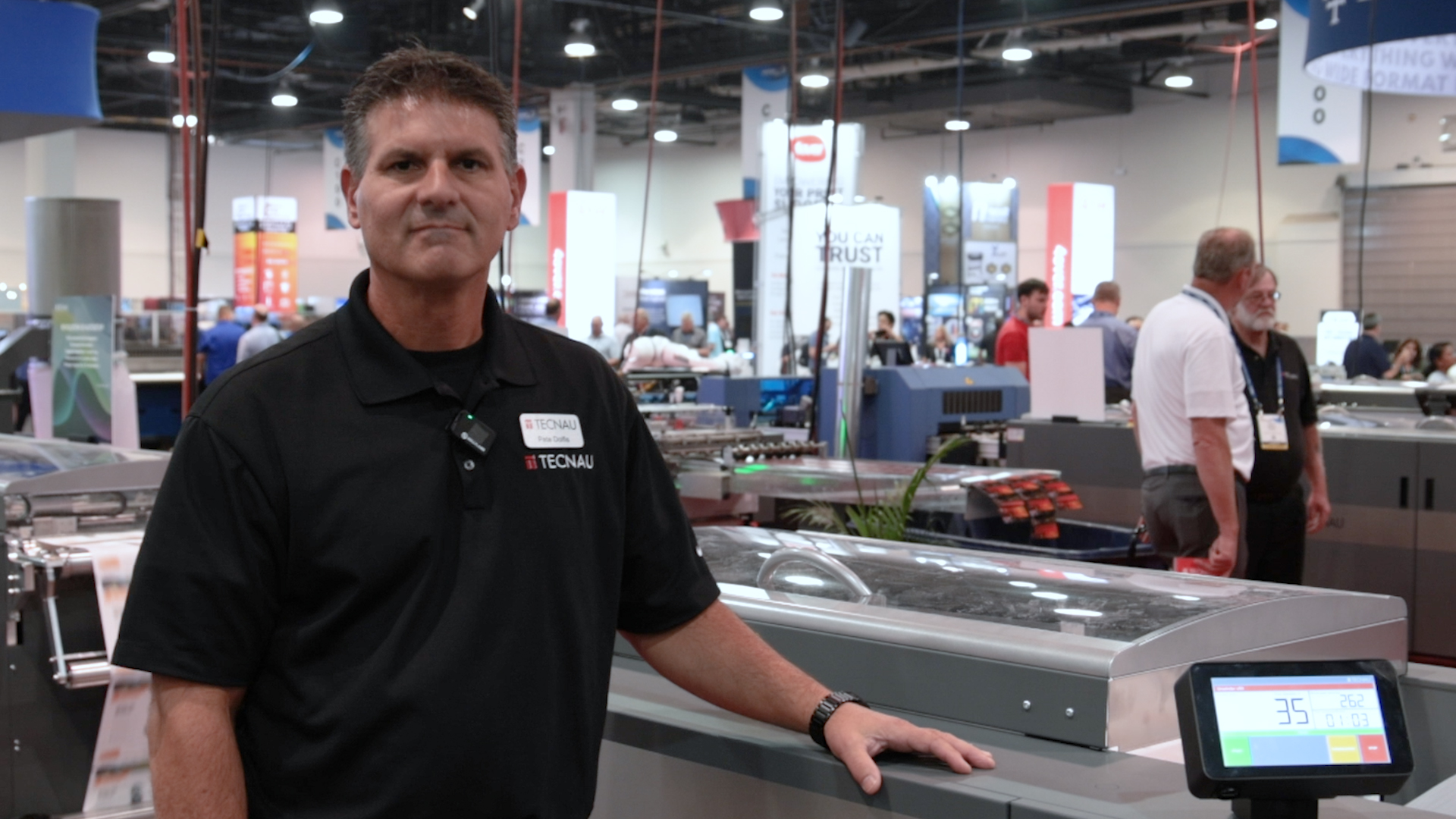Commentary & Analysis
Displaying 2751-2850 of thousands of articles
Insight You Need. Analysis You Trust.
Get the trusted insights you need to understand our evolving industry and emerging trends. Become a Premium Member.
Marketers Are Starting to “Get” the Real Benefits of Personalization
According to data from Evergage/Research International, marketers are starting to “get” one of the most fundamental values of personalized experiences. Yes, personalization drives immediate sales, but more importantly, it creates better customer experiences and higher customer loyalty, which drive better ROI over time. The shift from a short-term to a long-term perspective is great news for everyone producing personalized campaigns, whether they are doing online personalization or not.
The Carpeted Area of Your Print Business
We have spent decades focusing and optimizing the production floor (where there is no carpet). It is time to focus our energies on the carpeted areas of the business which impact customer’s perceptions of our business.
Shifting From an Omni-Channel to an Immersive Customer Experience
Omni-channel campaigns have become old hat; marketers today are looking beyond omni-channel to fully immersive customer experiences, often using augmented reality. Colorkarma’s Shoshana Burgett looks at some cutting-edge examples.
Corrugated Re-Envisioned—Part 3: Preprint (Print and Laminate) Even More Choices!
High color corrugated packaging is growing and will continue to grow. The run sizes are getting smaller to adapt to the new market requirements, and the opportunities for print service providers to jump on this moving train abound. In Part 3 of this series, I focus on the available preprint solutions with some limited product mentions. Selecting which method is better is really based on a lot of factors, including your market opportunities, capital investment, production costs, and internal skills. Although making that determination also involves board and run size as well. Both analog and digital presses are and will continue to be in the mix and grow. It’s a pretty exciting time with some great opportunities.
How George Brown College Is Addressing Workforce Needs and More in Textiles and Apparel
You can’t attend any textiles and apparel events or speak with industry professionals without the subject of workforce challenges arising. Senior Editor Cary Sherburne spoke with Marilyn McNeil-Morin about the Fashion Exchange program at Toronto’s George Brown College that has programs in place to help address these issues.
Graphic Arts Employment—December 2019
In December 2019, overall printing employment dropped -0.2% from November, and on a year-over-year basis, it is down -2.4%. Production employment was down -0.5% from November to December (and -4.4% Y/Y) while non-production employment was down -0.1% from November to December—but actually up +1.7% Y/Y.
Around the Web: Sustainable Straws. Mobile Meetings. Floating Fashion. Classic Critique. Latest Lenses. Fractious Footwear. Cleaver Calming,
The growing market for paper straws. A slow elevator designed for fast meetings. A paperboy helps save a restaurant from fire. A balloon-based fashion collection. A new book collects old airline maps. Another new book collects photographs of famous economists. Which classic novels are the most-loved—and most-hated? Contact lens-based displays. Are new running shoes “technological doping”? Merit badges for—oy—“adulting.” Three words: “meat cleaver massage.” All that and more in WhatTheyThink’s weekly miscellany.
Digital Color Print for Labels & Packaging: Aqueous Inkjet Is Rising
Although UV technology currently dominates the inkjet printing market, aqueous printing is gradually rising. This article provides a brief overview of the inkjet printing market and considers what the future may hold for UV and aqueous technologies.
EFI Connect 2020 Rounds Out a Year of Dramatic Change for the Company
EFI Connect 2020 marked the 21st year this user conference has been held, and the 13th year it has been hosted at the Wynn Hotel & Resort in Las Vegas. This edition marked a year of dramatic change for the company, with the departure of long-time CEO Guy Gecht, a short-lived CEO in Bill Muir, and an acquisition by Siris Group that took the company from public to private. EFI Connect 2020 was an opportunity for customers to gain first-hand insight into what these changes might mean for them.
Emerging and Transitional Economies Drive Growth for Retail-Ready Packaging, Says Smithers Market Report
Demand growth for retail-ready packaging is originating within emerging and transitional economies, with Asia-Pacific accounting for 4.5 million metric tons—nearly half the total global demand—according to Smithers’ latest report, The Future of Retail-Ready Packaging to 2024.
New Insight into Why Targeting Works
When we think about creating relevance in marketing communications, we think about personalizing based on traditional factors such as demographics and past purchases. But the principle of “liking” adds another useful dimension to the equation.
Solving Print Business Challenges with Software
Describe your business challenges: be specific, be precise. Then let go of any attachment to the “how this business challenge gets solved by print software.” You want your business challenges solved. One of the fastest ways to solve them is to describe them accurately and then to be open to all the possible solutions.
Corrugated Re-Envisioned Part 2—Direct Print (Post-Print) Lots of Choices!
In Part 2 of this series, I focus on the available digital post-print solutions with some limited product mentions. Leading up to drupa, I will cover some of the offerings in greater depth. All of the solutions discussed here are “single pass” printers, where the printheads are stationary and only the media moves. They include complete corrugating equipment with built in printing, to a tabletop printer with lots of other options in between. Equipment pricing ranges from in excess of $4MM to as low as $19K. In summary: Lots of Choices!
For Phoenix’s Custom Graphix, It’s a Banner Day
Since its founding in 2002, Phoenix, Ariz.’s Custom Graphix Signworks has cornered the market on that most commoditized of wide-format applications: banners. We spoke with Mladen Mike Mirkovic, founder and principal of Custom Graphix.
Prima-Tex Helps Customers Understand Differences Between Digital and Analog Textile Printing
At last month’s AATCC/SGIA Digital Textile Printing Conference 4.0, I had the pleasure of meeting Jonathan Tio and his brother Patrick of California-based Prima-Tex. His active and informed participation in the conference discussions were an inspiration, and he agreed to a subsequent interview for this article.
Here Is Your 2020 Sales Template
One of the most important activities at the start of the year is a quick review of the processes that go into ensuring the smooth flow of business. Often overlooked is how sales team members gather the information needed to bring a job into production, whether it is a new job or one that has been in production for years. Pat McGrew offers a template to use to standardize the information captured during the sales process.
Commercial Printing Establishments—2017
The latest edition of County Business Patterns is out, which updates the number of establishments and other data. In 2017, there were 25,256 establishments in NAICS 323 (Printing and Related Support Activities). The majority of these establishments (71%) have fewer than 10 employees.
Around the Web: Lavatory Literature. Modulated Mummy. Ubiquitous Unicorns. Streaming Salvos. Tiny Type. Cranium Confusion. Forensic Flipping. Pigeon Parade.
“Facility” is a new print magazine all about bathrooms. Giving voice to a 3,000-year-old mummy. Op-eds from the future. The opening salvos in the streaming wars. Stores are compensating for poor packaging design choices. Dante’s Inferno for language pedants. The battle over a cryonically frozen head. A home renovation show that remodels crime scenes. A concerto for orchestra and typewriter. The Nevada Avian Milliner is back. Also: Robopigeon! Hide the statues! All that and more in WhatTheyThink’s weekly miscellany.
The Perfect Print: Understanding Resolution and Color
Any time textile professionals gather, color management is always a topic of discussion. It becomes even more complex when introducing digital fabric printing into the mix. WhatTheyThink contributor and textiles expert Debbie McKeegan shares insights on achieving the perfect print.
The Most Important Number(s) in 2020
As we enter another new decade, several points of disruption are expected to emerge. This article provides a brief overview of the developments that print service providers should be mindful of, as well as the financial and operational information that should be used for strategic business growth.
Purchasing a Web-to-Print Solution
You purchase software to solve business problems. When evaluating software, keep your focus on the challenges you want to solve. This will keep you open-minded about all the possible ways your challenges might be solved, rather than attachment to one specific solution.
Want More Donor Revenue? Write a Better Thank You Letter
Data insights and expert testimony tell a powerful tale: a nonprofit’s “thank you” letter matters more than many people might think. Get it right and donors feel great and are motivated to keep giving. Get it wrong and they disconnect. So get it right!
Packaging Preview: Corrugated Post-Print Re-Envisioned—Part 1
There are “two primary” corrugated print manufacturing processes for high graphics: a multi-process method of printing on a top sheet (liner) which is then laminated to the corrugated material, or, alternatively, a single process method of printing directly on the corrugated material, sometimes called “post-print.” In this article, we will look at the award-winning Bobst THQ (Très Haute Qualité) FlexoCloud technology focused on corrugated post-print production, and perhaps some alternative methods.
Direct Objects: Thinking—and Printing—Outside the Box
One of the most exciting growth areas in print today is direct-to-object (DtO) printing, but challenges of ink adhesion, transport, and feeding abound. I spoke with Peter Baldwin, Director of Marketing for East Dorset, Vt.’s Engineered Printing Solutions (EPS), about some of the issues—and opportunities—involved in direct-to-object printing.
Springs Creative Leverages 133 Years of Textile History for Today’s Digital Printing
At the AATCC/SGIA Digital Textile Printing Conference 4.0 last December, one of the high points was a presentation by Kathy Phillips, Vice President of Design/Trend at Springs Creative, a show-and-tell that highlighted the company’s rich history in textiles, beginning with the founding of the Fort Mill Manufacturing Company in 1887 by Samuel Elliot White. We talked with Phillips to get more detail on this fascinating story to share with our readers.
3D Printing: Seven Technologies and a Multitude of Materials
More than 30 years since the invention of 3D printing, a host of materials in addition to plastics—metals, alloys, composites, and biomaterials—are all used by companies worldwide to make everything from prototypes to finished goods. In this article, Pete Basiliere looks at the various 3D printing technologies and materials.
November Printing Shipments: Off for the Holidays
The value of printing shipments for November 2019 was $7.03 billion—a pretty big drop from October’s $7.65 billion, but we kind of expected it, as November and December see business slow down for the holidays.
Around the Web: Fabricating Food. Smart Sweats. Clever Kicks. Receipt Wrap. Slaking Slack. Erroneous Ebooks. Mellotron Music Musing.
3D-printed candy. Rechargeable workout clothes. Smart sneakers can improve your running form. A knitted scarf based on a CVS receipt. Living concrete. A new, more accurate typewriter font, for some reason. How Slack has ruined work. Library ebook provider Overdrive acquired by private equity firm. Why was there no ebook revolution in the 2010s? “The” most powerful word in the English language. A journey inside the Mellotron, one of the weirdest musical instruments. All that and more in WhatTheyThink’s weekly miscellany.
Print Remains a Vital Component of the Transactional Communications Mix
Although there is no denying that digital communications are becoming increasingly popular, consumers’ rising affinity for digital access does not necessarily mean that printed mail will fall to the wayside. Instead, InfoTrends’ research suggests that print will remain an important component of the overall communications mix. This article cites InfoTrends’ most recent transactional communications survey data to explore print’s changing role as market dynamics continue to shift.
The CEO’s Perspective
Peter Drucker once wrote that the one contribution a CEO is uniquely expected to make is to give others vision and the ability to perform. Leadership in an organization is important but to succeed, it requires motivated, energized, and engaged followers.
Creative Ways to Market in Print You Probably Haven’t Considered
Collection of print case studies showcasing how print can be used in ways that most of us have never considered. While many case studies showcase the high-end “most clients can’t afford this” kind of possibilities, these show the use of simple, traditional techniques in ways that make you stop and say, “I wish I’d thought of that!”
Optimize the Print Software You Own
Treat software like printing press hardware: assume your people and your processes have to change to optimize the new software rather than staying attached to how you think the software should work.
Good Chemistry: Wide-Format Inks Continue to Evolve—Part 1 of 2
Whether it be for production inkjet, packaging, wide format, or industrial printing, inks are evolving at a rapid pace to enable the fast-growing range of print applications. This article will offer a look at some of the recent developments specific to wide-format inks—and even more specific to solvent/eco-solvent and UV inks.
The Future of Corrugated—Lots of Opportunity and Lots of Choices!
One of the more active growth areas for print service providers and of digital printing equipment development is corrugated, and for good reason. Estimates of corrugated shipments in North America are in excess of 420 billion square feet and growing. Estimates for three or more color “high graphics” corrugated production is growing as well with actual output for 2019 anticipated to have 20%–30% share of the overall corrugated volume. Overall, this is an exciting market with a lot of growth potential.
Three Easy Sales Enhancers for Q1 2020
Every new year brings new opportunities to grow your business. From printers to the vendors who support them, there is an opportunity in every segment and in every size print shop. Pat McGrew identifies three main “sales enhancers” to add to your 2020 business plan.
unspun Delivers Size-Free Green Jeans On Demand
If you grew up, as I did, watching Captain Kangaroo, you’ll remember Mr. Green Jeans. These days, Green Jeans has an entirely different meaning, and San Francisco/Hong Kong based unspun set out to define the category.
Establishment Births/Deaths: Industry Attrition Continues to Slow
From 2015 to 2016, there had been an increase of 1,586 establishments, but a decrease of -1,881 establishments, for a net loss of -295 establishments. That’s a smaller percentage change than previous years, which reflects somewhat of a deceleration in industry consolidation.
Around the Web: Fur Fracas. Delivery Droid. Seen at CES. Audi’s Interior. Enhanced E Ink. Scrappy Scrabble. Bloody Billboard. Bivalve Boogie. Crazy Cats.
NYC’s proposed ban on fur (for fashion) causes a kerfuffle. A wearable plant vest that is...er, self-watering. A bipedal delivery robot is now for sale. Japan recycles cardboard to use as beds for the 2020 Tokyo Olympics competitors. A roundup of “highlights” from this week’s Consumer Electronics Show. “Charmin looks to disrupt the toilet experience with new technologies.” An inflatable pub for grown-up parties. At last: a color E Ink display. A deep dive into the history of the board game Scrabble—and the small Vermont town that used to manufacture all the letter tiles. A brilliant billboard advertising the new “Dracula” series. Two words: “disco clam.” Pro tip: don’t see the new “Cats” while tripping on LSD. All that and more in WhatTheyThink’s weekly miscellany.
2020: The Year of Data!
Up until now, technologies like cloud computing, data analytics, and artificial intelligence have largely been used independently. Moving forward, these solutions will begin to converge, building more sophisticated data-driven workflows. This article explores how 2020 will likely shape up to be a year of data.
Digital Pigment Gains Ground on Analog Production
In the printed textiles market, pigment inks are a hot topic due to their ability to print brilliant colors on a wide variety of fabrics, often without pre-treatment. WhatTheyThink contributor and textiles expert Debbie McKeegan explains why.
CMO Council Survey: Channel Choice Matters
To find out what consumers really think about channel preferences, the CMO Council surveyed 2,000 consumers in English-speaking countries across the world. The takeaway? Understanding, tracking, and responding to consumers’ channel preferences has never been more important.
SGP Adds a New Certification and Community Events for 2020
The Sustainable Green Printing Partnership (SGP) is complementing its Printer certification with a Supplier certification, and in 2020 will be ramping up its outreach and education efforts with regional “lunch and learn” forums. We caught up with SGP’s Marci Kinter to talk about what’s new with SGP as we enter a new decade.
Meritocracy-Based Business Decisions
Technology is invading every corner of the print industry, and many print business owners are novices when it comes to technology. How do you make good business decisions when you are not the subject matter expert? Whom do you listen to? How do you know they are qualified? Run your business like a meritocracy.
Actega EcoLeaf (aka Nano Metallography) Digital Metallization Ready for Prime Time
At drupa 2016, Landa Labs introduced Nano Metallography, a new metallization technology to replace foils for embellishments. This process is designed to produce zero waste at less than half the cost of foil. In February of 2017, Actega Metal Print, a division of Altana AG, acquired the technology and rebranded it EcoLeaf. The solution is now going into beta and will be fully commercialized in time for drupa 2020.
Five Packaging Design Trends That Work
The packaging world is evolving across shape, form, and function. Agencies and designers have novel canvases to work with. Here are a few packaging trends being seen in various markets, and why each is unique.
The Penguin’s Native Tongue is Now German—December 2019 M&A Activity
Bertelsmann Buys Balance of Penguin Random House, Ripon is Sold, Blackstone Invests in HH Global, and more…
Replicate the Real Thing
One of the fastest-growing applications in wide-format and industrial printing is textures. While a lot has been written about how these kinds of materials are printed, not much has been said about how these textures are created. This article looks at multi configuration scanners from METIS, used to capture high-quality, photorealistic reproductions of existing surfaces.
AATCC and SGIA Digital Textile Printing Conference 4.0 Another Huge Success
For the fourth straight year, AATCC and SGIA joined forces to bring the Digital Textile Printing Conference to the industry, a forum that addressed pressing issues and provided nearly 140 attendees with the ability to learn, network, and provide feedback that will help the associations continue to meet the needs of an evolving industry.
The Next Chapter in the Printing Profits “Tale of Two Cities”
Industry profits data for the third quarter of 2019 were down from $3.05 billion in Q2 to $2.65 billion. Large printers continue to be the trouble spot.
Around the Web: Decade Dilemmas. Fiber Fallout. Paper Packing. Tentacle Trouble. Nifty Notebooks. Clever Keyboard. Helping Hive.
What are technology’s biggest challenges for the next decade? What are the top emerging technologies? Are natural fibers better for the environment than artificial fibers? Paper-based alternative to Bubble Wrap. The eternal struggle: eagle vs. octopus. For sale: Alaskan newspaper. Cost: $0. A teenager installs a 1,500-pound mainframe computer in his parents’ basement. A portable roll-up keyboard for smartphones and tablets. The rebirth of cursive writing? Bees as service animals. Rejoice: Gary Larson’s “The Far Side” is now online! All that and more in WhatTheyThink’s weekly miscellany.
Reinventing the Craft Industry Utilizing Digital Textile Printing
The Maker movement continues to grow around the globe. In this post, WhatTheyThink contributor and textiles expert Debbie McKeegan outlines how digital technologies are spurring even further growth and opportunity in the UK market. These trends are relevant to North America as well, enabling creative individuals, designers, and artisans to build their own unique businesses and together generate a vibrant craft Industry in ever increasing numbers.
Effective Sales Training Starts with Strategy
Print service providers with the highest growth rates employ great salespeople, so investing in your salespeople makes sense—especially with the rapid rate of change in our industry. New technologies and evolving buyer behaviors leave us with no choice; we either continue to learn or we become obsolete. Print service providers often believe that sales training is the key to closing more deals. Although this is a sound belief, it’s only part of the story. This article explores ways to ensure that your sales training investment pays off.
Most Adults Don’t Learn Until They Have To
People in your organization have to keep learning new things so that you can continue to optimize your business using new tools (mostly software). Leadership’s job is to deliver the “have to” part of the learning equation.
10 Industry Changes That Make Me Grateful
Looking back, the industry has changed considerably in 20+ years. Here is a list of 10 changes for which I am grateful. How about you?
Three Things to Stop Doing in 2020
As 2020 approaches, it’s a great time to break bad habits that can be costing your business money. Pat McGrew identifies three bad habits for print businesses to break in 2020.
Drive Your Business at the Mailbox: Learn How to Design Better Direct Mail
Everyone loses when poorly designed pieces make it into the mail, so making direct mail better should be a priority for every print organization that even remotely touches the direct marketing segment. In this article, Elizabeth Gooding offers some best design practices for effective direct mail.
Executive Q&A: Massivit 3D’s Erez Zimerman
Lod, Israel’s Massivit 3D was founded in 2013, and in the past six years has made a substantial impact with its 3D printing technology. Erez Zimerman joined Massivit 3D four years ago as VP of Global Sales, and was appointed CEO in May 2019. We caught up with Zimerman at the recent PRINTING United show in Dallas.
Shimmy into the Digital Future with AI-Supported Training for Textile Workers
At the recent SPESA Executive Conference, I had the pleasure of meeting Sarah Krasley of Shimmy, a company that provides training for garment workers using gamification (to make it more engaging) and artificial intelligence for localization, among other things. With automation increasingly expected to eliminate jobs in the textiles and other industries, upskilling of these workers is a critical investment in our future—and theirs.
Around the Web: Gaga for Graphene! Vexing Valuation. DNA Data. Explaining Ecommerce. Sham Shipping. Stalking Signage. Mysterious Millinery.
A graphene jacket. A costly typo in Utah. Merriam Webster’s Word of the Year. The DNA of things”—creating materials with built-in memory. Intricate paper sculptures of microorganisms. Free shipping isn’t always free. User-tracking billboards—and with whom they share data. Who is putting hats on Las Vegas pigeons? KFC’s chicken-scented yule log. All that and more in WhatTheyThink’s weekly miscellany.
October Printing Shipments: Raise a Glass of Holiday Cheer
The value of printing shipments for October 2019 was $7.65 billion—a pretty big jump from September’s $7.14 billion. October has become the biggest month of the year, and this is the best October the industry has had since 2016.
Future-Proofing Your Workflow
2019 ushered in new levels of interest in improving and automating workflows, but the level of actual implementation was not as high as we would have hoped to see by now. This article explores some of the barriers to workflow automation and offers insight on overcoming them.
What’s the Point of Behavioral Assessments?
We can have the best business model—i.e., value proposition, profit formula, conversion process, technology, etc.—but if we don’t have qualified people suited to the jobs they hold, it all falls apart. Is this the sort of risk you are willing to take? Shouldn’t you give as much thought to hiring decisions as you do to equipment and software decisions?
Basic Personalization Isn’t Enough Anymore
Where are retailers along the curve of personalized marketing? What is the ROI? What works and what doesn’t? These were some of the questions Liveclicker wanted to answer with its report “Driving Value with Advanced Personalization.” The takeaway? Basic personalization isn’t enough anymore.
What is Your Print Business Differentiation?
What do you provide for your sales team to get the upper hand in the marketplace? Do you have differentiation? Are you investing in something that will not only win new customers but keep existing ones?
Flexible Packaging with Inkjet Gets Fast and Wide
Uteco and Kodak have just announced that they sold the first UTECO Sapphire EVO W product production inkjet press designed for flexible packaging. The “W” refers to “Wide” since this press has a 1250 mm (49 in.) width. The EVO W is the first press to be powered by the Kodak ULTRASTREAM technology. The press supports a higher resolution of 600 x 1800 dpi at up to 150 mpm (492 fpm). Overall productivity can be 4X over existing digital solutions.
Wide-Format 2019: Where Are We Now?
As 2019 winds down, we take a look at the current state of wide-format printing. Where have we come, where are we now, and where are we going?
Blunt Skincare One of First CBD Companies to Consider Neenah’s Hemp Fiber Folding Board for Packaging
A cosmetic chemist who has worked with some of the largest beauty brands, Stas Chirkov saw an opportunity to develop his own line of skincare products based on industrial hemp. In this article, he explains how he got started and details how specialized packaging impacts his ability to market his products.
Digital Printing Driving Innovation in Textile Printing
For decades, digital printing for the fashion, décor, industrial, and graphics industry was relegated to sampling and short-run printing. With the advantages of innovative inkjet technology, the industry is now addressing the demand for environmentally responsible output, innovative designs, and the need to improve supply chain operation. This article examines the latest textile industry trends and the dynamics of digital innovations on this massive industry supply chain, and looks at innovations in design and digital print, as well as cutting and sewing of textile-based products.
Commercial Printing: Consolidation or Regional Expansion? —November 2019 M&A Activity
Mittera acquires business assets of Fuse, Knepper purchases Dual Print & Mail, H.I.G. Capital invests in print (again), and more…
Around the Web: Crafty Carlsberg. Couture Clash. Fatal Fashion. Local Losses. Sham Shipments. Brainy Brush. Cuneiform Cookies. Purring Professors.
Carlsberg Group replaces plastic ring carriers and shrinkwrapping with innovative adhesive dots. The environmental toll of haute couture. A textile-based horror movie. The death of local news. An interactive look at the graphic design and development of New York City’s subway map. An AI system attempts to write about printing shipments. “A fitness tracker for your mouth.” A new look at Marco Polo’s last year in Venice. A Welsh password generator. Cats teaching economics. A $1 hotel room—exhibitionists preferred. A smoke-breathing Godzilla Christmas tree. All that and more in WhatTheyThink’s weekly, Baby Yoda-free miscellany.
First Look: Industry Business Conditions 2019
Preliminary results from our 2019 Business Outlook Survey show that one-fourth (24%) of survey respondents reported that, compared to 2018, revenues for 2019 were up more than 10%. That’s the highest this has been since we started our annual survey in 2015. Elsewhere, though, things are a bit more muted.
The Role of Spandex in Digitally Printed Athleisure and Performance Sportswear
Spandex, Lycra, elastane: Whatever would we do without these stretchy, comfortable fabrics. And digital textile printing adds even more flexibility to what can be done with them. Textiles guru Debbie McKeegan explains.
Exploring the Barriers—Real and Imagined—to Augmented Reality
Many print service providers are considering if and how AR solutions might improve their product offerings. This article explores some of the perceived barriers to AR adoption. Although some of these barriers are very real, some PSPs may be surprised to learn that the impact of others has been exaggerated.
Heat Transfer Dye Sublimation: The Next Profit Opportunity for Commercial and Display Graphics Printers
Cary Sherburne looks at how print businesses can profit from offering heat-transfer dye-sublimation services, including textile-based products, as well as mugs, metallic substrates, and more.
2D and 3D Printing Have More In Common Than You Think
The technological innovations that propel 3D printing also drive advances in 2D printing technology. Whether software, firmware, or fluids, what manufacturers learn about jetting materials for 3D printing can be applied to 2D printing—and many familiar names in the 2D printing space are active in 3D. In this article, Pete Basiliere of Monadnock Insights reports from Formnext, the largest 3D printing technology conference and exhibition, and identifies where 2D and 3D printing technologies overlap.
Trends in Digital Video Advertising
Round-up of digital video advertising trends and top-line data on the digital video advertising market.
The Print Customer’s Narrative
A customer narrative documents the experience of doing business with you—from the sales process all the way through invoicing—from the customer’s perspective.
AATCC and SGIA Join Together to Present the Digital Textile Printing Conference 4.0
The Digital Textile Printing Conference 4.0, jointly presented by AATCC and SGIA, is a great way to wrap up a year full of dynamic change for the industry. It’s a full agenda designed to address the needs of everyone, from those that need a primer on digital textile printing, to those looking to expand their digital footprint, to developers who want to bring to market solutions closely attuned to existing and emerging market needs.
How To Sell Enhanced Printing
“Digital enhancement” or enhanced printing is one of the hottest trends in the industry and has been the talk of many recent trade shows—but enhanced print doesn’t sell itself. Pat McGrew offers some tips and strategies for selling enhanced printing to maximize ROI.
CannaBath: From Massage Therapist to CBD Entrepreneur
The market for CBD-based products is exploding, and will grow even more once a few of the regulatory issues have been ironed out. California-based CannaBath is an example of an entrepreneurial company that has brought CBD-based bath and body products to market and has benefited from a creative approach to packaging these products in partnership with San Diego-based Hippo Packaging.
Cyber Risk Management in the Printing Industry
If you have one employee, one customer, one supplier, you have data, and that makes you a target. Are you ready for the inevitable?
Product Spotlight: Konica Minolta’s AccurioJet KM-1 LED-UV Inkjet Press Delivers 90% Uptime for Franklin Direct Marketing
Senior Editor Cary Sherburne interviewed Craig Chumney, Vice President of Baton Rouge-based Franklin Direct Marketing, to gain insight into how the acquisition of a Konica Minolta AccurioJet KM-1 UV inkjet press has enhanced his business.
Before-and-After Shots Show Anti-Greenwashing Efforts Are Working
Two Sides North America has been on a campaign to remove greenwashing. Here’s visual evidence that it’s working.
BOBST Ups the Stakes with Next-Generation Hybrid Press and More
BOBST has been providing solutions to the printing and packaging industries for four generations, and more recently has added digital textile printing to the mix. Cary Sherburne talks with CEO Jean-Pascal Bobst.
Digital Print Output to Grow 65% over Next 10 Years, According to New Smithers Strategic Forecast
Digital print output is forecast to grow by 65% over the next 10 years to reach $230 billion by 2029. This dynamic growth rate will be driven by incursions into package printing, as well as books and other graphic printing areas, according to Smithers report The Future of Digital Print: Long-Term Strategic Forecasts to 2029.
Know the Signs: A Non-Print Signage Primer
Print businesses have been expanding into signage by leaps and bounds—but print signage is only the tip of the iceberg. “Signs” comprise a lot of different manufacturing products and materials.
Color Management: Gandhi, Pop Music, the Human Psyche, and Resolve
How are the players in the print production process like a group of musicians playing on stage? Idealliance CEO Tim Baechle offers advice for filtering out all the noise we are bombarded with and focusing on “playing in time” with others in the supply chain.
Buy a Sweater, Adopt a Sheep
As the textiles and apparel industry continues to take heat for its highly negative impact on the environment, some companies are taking creative approaches to not only creating sustainable garments, but pushing the industry to take more aggressive steps toward carbon-neutral operation. Sheep, Inc., is one of those companies.
October Jobs: Production Down, Managerial Up
In October, overall printing employment dropped -0.3% from September. On a year-over-year basis, though, it was down -2.4%. Production employment was down -0.7% from September to October, but year-over-year was down -4.8%. On the other hand, non-production employment was up +0.7% from September to October, and year-over-year was up +2.9%.
Around the Web: Publishers’ Peril? Gargantuan Gannett. Assessing AR. Female Pirate Printer. Festive Footwear. Shirt Supreme. Goofy Gravy.
What happens when a print publication goes all-digital? Has Apple News Plus cannibalized publications’ own digital efforts? Gannett and GateHouse to merge and create the biggest newspaper publisher in the US. What is in store for AR in 2020? Well, not Apple Glasses. Manhole cover-based art. Painting on Vans loafers. Hacking into pet dishes? A unique way to drug your Thanksgiving guests. All that and more in WhatTheyThink’s weekly miscellany.
The RMX Network: United They Grow
The RMX Network is an alliance of more than 100 independent North American wide-format print service providers. It’s not a franchise, but rather an affiliation of like-minded companies that band together to support each other and help solve problems. We spoke with President Rick Bosworth to learn more about their unique business model.
Reinventing Interiors—A Digital Transformation
Digital textile printing is being used for more than apparel. Interior design is a hot market as well! Textiles guru and WhatTheyThink contributor Debbie McKeegan explores the effect of digital printing on an industry with many similarities to that of fashion: the interiors sector, including wall coverings.
Who Went to the 2019 Digital Packaging Summit and Why?
The 2019 Digital Packaging Summit (November 11–13) makes keeping a finger on the pulse of the industry a little easier. The equipment and technology providers, packaging and label manufacturers, and analysts in attendance gathered together for a master's level educational experience. This article provides a brief overview of the event and its benefits to the industry.
Your Postal Strategy: Key Benefits of Postal Resources, Experience and Expanding Your Network
Does your organization have a postal strategy? Mailing may be considered an ancillary service offering for a professional printing company, or it may be your core offering as a mail service provider.
Survey: Consumers’ Willingness to Give Up Personal Data is Waning
In the past, surveys have shown that people are willing to provide their personal data in exchange for personalized experiences, but new research from the Advertising Research Foundation (ARF) shows that this willingness is changing. What’s going on?
Selling Print vs. Selling Web-to-Print Software
Your print sales people need a different perspective when selling web-to-print solutions. They need to understand short vs long term benefits as well as how the customer’s convenience is driving loyalty.
Kodak Celebrates 20 Years of Prinergy in Berlin
Kodak Prinergy celebrates its 20th anniversary this year, and European customers marked the occasion with a gala held in Berlin, Germany, last October. WhatTheyThink’s Pat McGrew attended the event.
The Moving Canvas: Wrapping “Kings” Turn Vehicle Graphics Into Art
Last Fall, Avery Dennison held its Wrap Like a King (WLAK) competition, which honored some of the best and most creative vehicle graphics projects. We spoke with one of the judges and some of the regional winners to get some insight into the vehicle graphics design process.
Transformation Is Not Always What You Plan…
David Zwang details the recent merger/acquisition dance going on between Xerox and HP, and the forces that are impelling both companies to transform—one way or another.
OnPoint Manufacturing to Add Digital Textile Printing for a Complete On-Demand Microfactory Implementation
OnPoint Manufacturing has been looking for a digital textile printing solution that could keep up with the rest of its manufacturing process for some time. The company has determined that the new Kornit Presto digital textile printer fits the bill. Senior Editor Cary Sherburne spoke with Chairman Kirby Best to learn why.
- Questions to ask about inkjet for corrugated packaging
- Can Chinese OEMs challenge Western manufacturers?
- The #1 Question When Selling Inkjet
- Integrator perspective on Konica Minolta printheads
- Surfing the Waves of Inkjet
- Kyocera Nixka talks inkjet integration trends
- B2B Customer Tours
- Keeping Inkjet Tickled Pink
© 2024 WhatTheyThink. All Rights Reserved.














